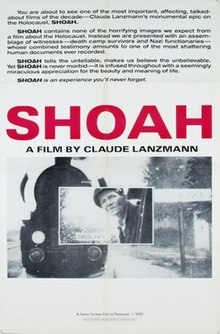| Shoah | |
|---|---|
 US theatrical release poster | |
| Directed by | Claude Lanzmann |
| Starring | |
| Cinematography |
|
| Edited by |
|
| Distributed by | New Yorker Films |
Release date |
|
Running time | 566 minutes[2] |
| Country | France[1] |
| Languages |
|
| Awards | |
| Box office | $20,175[3] |
Shoah is a 1985 French documentary film about the Holocaust (known as "Shoah" in Hebrew since the 1940s[4]), directed by Claude Lanzmann. Over nine hours long and 11 years in the making, the film presents Lanzmann's interviews with survivors, witnesses and perpetrators during visits to German Holocaust sites across Poland, including extermination camps.[5]
Released in Paris in April 1985, Shoah won critical acclaim and several prominent awards, including the New York Film Critics Circle Award for Best Non-Fiction Film and the BAFTA Award for Best Documentary. Simone de Beauvoir hailed it as a "sheer masterpiece", while documentarian Marcel Ophüls (who would go on to win the Academy Award for Best Documentary Feature for Hotel Terminus: The Life and Times of Klaus Barbie three years later) called it "the greatest documentary about contemporary history ever made".[6] Conversely, it was not well received in Poland, wherein the government argued that it accused Poland of "complicity in Nazi genocide".[7]
Shoah premiered in New York at the Cinema Studio in October 1985[8] and was broadcast in the United States by PBS over four nights in 1987.
- ^ a b "Shoah (1985) Claude Lanzmann" (in French). Bifi.fr. Retrieved 1 August 2019.
- ^ "SHOAH (PG)". British Board of Film Classification. 13 June 1986. Retrieved 2 February 2016.
- ^ "Shoah (2010)". Box Office Mojo. IMDb. 6 January 2011. Retrieved 2 February 2016.
- ^ For the term Shoah and Lanzmann's decision to use it, see Stuart Liebman, "Introduction", in Stuart Liebman (ed.), Claude Lanzmann's Shoah: Key Essays, Oxford: Oxford University Press, 2007, 7.
- ^ J. Hoberman, "Shoah: The Being of Nothingness", in Jonathan Kahana (ed.), The Documentary Film Reader: History, Theory, Criticism, Oxford: Oxford University Press, 2016, 776–783.
Also see Claude Lanzmann with Marc Chevrie and Hervé le Roux, "Site and Speech: An Interview with Claude Lanzmann about Shoah", in Kahana (ed.) 2016, 784–793.
- ^ Liebman 2007, 4.
- ^ Lawrence Baron, "Cinema in the Crossfire of Jewish-Polish Polemics: Wajda's Korczak and Polanski's The Pianist", in Cherry and Orla-Bukowska 2007, 44.
- ^ Cite error: The named reference
nytimes1was invoked but never defined (see the help page).